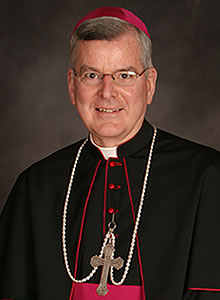
In his apostolic letter dated Oct. 11, 2011, Pope Benedict XVI calls for a Year of Faith to mark two great events in today’s Catholic Church, the first being the 50th anniversary of the opening of the Second Vatican Council and the second being the 20th anniversary of the publication of the Catechism of the Catholic Church.
This commemorative year will begin on Oct. 11, 2012 and conclude on Nov. 24, 2013, the Solemnity of Christ the King. The year will follow upon two other special years that the same pope has already marked recently, namely The Year for Priests and The Year of St. Paul. And, like those other commemorative years, the Year of Faith will provide a specific focus for our meditation as well as our preaching and teaching.
Time of grace
The theme of the Year of Faith is taken from St. Paul’s second letter to Timothy (1:12), “I know him in whom I have believed.” This passage emphasizes both the encounter of the believer with the person of Jesus Christ as well as a growing understanding of the content of the faith.
On the macro-level of the Church Universal, the Year of Faith will encourage pilgrimages to Rome, to the Holy Land and to any number of Marian shrines. In October, the 13th Synod of Bishops will address the question of the New Evangelization. And the next World Youth Day, scheduled for Rio de Janeiro, will direct today’s Catholic youth to reflect on this same topic.
On an archdiocesan level, the Year of Faith dovetails nicely with our plans for a Year of the New Evangelization. A solemn archdiocesan liturgy will celebrate the beginning of this special period of grace and another will mark its closing.
I have also asked our archdiocesan Office of Worship to provide resources for a special Mass to be celebrated in each parish on the weekend of Oct. 10-11, 2012. These resources will be published soon.
In addition, I have asked for a special prayer to be composed and to be prayed either at the end of every Sunday Mass or at the end of the Prayers of the Faithful during liturgies celebrated in the archdiocese throughout this Year of Faith.
I would also hope that novenas could be conducted before the feasts of Our Lady of Guadalupe, Christmas and Pentecost; that Stations of the Cross be conducted on the Fridays of Lent throughout the local church; that a model 40-hour eucharistic devotion be celebrated in at least one parish in each of our vicariates and that eucharistic processions be planned on the Feast of Corpus Christi. All of these are initiatives that parishes could begin on their own.
I would like to see Perpetual Help devotions reintroduced to our parishes as well as an increased encouragement for eucharistic adoration, especially among our young Catholics. Parish missions would also be an appropriate activity to hold during this upcoming year.
Study days or seminars on the documents of the Council and/or the four pillars of the catechism could be offered in each of the three regions of the archdiocese. The Catechetical Institute at the St. Paul Seminary could serve as a rich resource for such an endeavor. Our two Catholic universities could offer a series of speakers on the relationship between faith and reason and how each serves, by different methods, in assisting us to find the truth.
In adult education courses, through the RCIA process and in our Catholic schools, parish groups might study and discuss how faith is both a personal encounter with the Lord as well as an interior adherence to the content of the Creed. Prayer services could also be organized around this theme. Book lists of solid, Catholic-thought could be prepared and offered for various levels of age-appropriate discussion groups.
The renewal, or even initial contact with our missions in San Felix, Venezuela and/or Kitui, Kenya by the parish council or another group of parishioners can help raise the consciousness among Catholics of our need to recognize the “missionary character” of our Catholic faith.
Ecumenical prayer services and discussions can help to deepen an appreciation of what our faith shares in common with other denominations as well as what are the major hurdles to that Christian unity for which Jesus prayed so ardently.
Family participation
As for the important participation of families in the commemoration of this Year of Faith, I would suggest a renewal of the custom of the blessing of homes by a priest or a deacon. Enthronement of the Sacred Hearts of Jesus and Mary is another powerful devotion that can be undertaken by families.
In addition, it is my hope that every Catholic home will join in this evangelization effort by having on its bookshelf a copy of the Bible as well as a copy of the Catechism of the Catholic Church. Both provide great resources for meditation, study and prayer.
As Cardinal Levada of the Congregation for the Doctrine of the Faith wrote so perceptively in commenting on the Holy Father’s announcement: “Every initiative for the Year of Faith should be designed to aid in the joyous rediscovery of the faith and its renewed transmission.”
I urge our clergy, religious and lay leadership to begin thinking of ways in which we can make this Year of Faith truly effective and meaningful in the lives of our people.
May God bless you!




